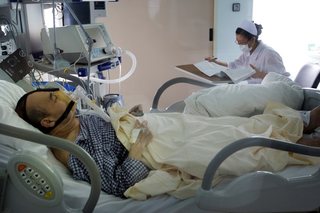Poland and Russia on Saturday mourned thousands of people massacred by the Soviet NKVD secret police during World War Two.
Published:
4 September 2000 y., Monday
Poland and Russia on Saturday mourned thousands of people massacred by the Soviet NKVD secret police during World War Two and vowed to strengthen the often strained relations between the two neighbors.
Polish Premier Jerzy Buzek and Russian Interior Minister Vladimir Rushailo dedicated a cemetery marking the mass grave of some 6,000 Poles shot in pine forests outside the Russian town of Mednoye, 200 km (125 miles) northwest of Moscow.
It is one of several mass graves in Russia and Ukraine that hold the bodies of some 22,000 well-educated Poles, including reserve officers, border guards, policemen and civil servants who the Soviets feared would oppose their control of Poland.
Soviet troops invaded Poland in September 1939 under a secret pact with Nazi Germany to divide Eastern Europe. The Germans broke the pact in 1941 when they invaded the Soviet Union and the territories it had occupied.
In 1943, German troops advancing eastward found the bodies of some 4,000 Polish army officers in a mass grave in Katyn and accused Soviet troops of killing them.
The Soviet Union maintained for decades that the Nazis had killed the men during their occupation of the area, admitting responsibility only in the final days of Mikhail Gorbachev's perestroika period. During World War Two, Poland's underground government also searched for officers who disappeared from prisoner of war camps near other towns, including Tver in Russia, from where prisoners were taken to the forest outside Mednoye. The bodies of about 7,000 Poles have never been found.
Šaltinis:
Central Europe Online
Copying, publishing, announcing any information from the News.lt portal without written permission of News.lt editorial office is prohibited.
The most popular articles
 51-year-old mother of eight, sits beside her sick husband, Tuy Muy, 52, in Battambang Provincial Referral Hospital. He is lying on a bed with a stomach problem, battling nausea and vomiting.
more »
51-year-old mother of eight, sits beside her sick husband, Tuy Muy, 52, in Battambang Provincial Referral Hospital. He is lying on a bed with a stomach problem, battling nausea and vomiting.
more »
 The length of maternity and paternity leave are at the heart of a crucial vote in the plenary sitting of March 24-25.
more »
The length of maternity and paternity leave are at the heart of a crucial vote in the plenary sitting of March 24-25.
more »
 The perception women have of the EU, the way the economic and financial crisis is affecting women and the lessons to be learnt ahead of the 2014 elections are among the issues to be tackled during a colloquium being held at the European Parliament on Tuesday.
more »
The perception women have of the EU, the way the economic and financial crisis is affecting women and the lessons to be learnt ahead of the 2014 elections are among the issues to be tackled during a colloquium being held at the European Parliament on Tuesday.
more »
 To achieve quicker de facto gender equality, Commission and Member States should adopt and implement specific gender equality policies, Parliament said in a resolution adopted on Thursday.
more »
To achieve quicker de facto gender equality, Commission and Member States should adopt and implement specific gender equality policies, Parliament said in a resolution adopted on Thursday.
more »
 Are you thinking about setting up your own business or are you already a successful entrepreneur? The Erasmus for Young Entrepreneurs exchange scheme offers an excellent opportunity for new entrepreneurs to acquire relevant skills for managing a small or medium-sized enterprise (SME).
more »
Are you thinking about setting up your own business or are you already a successful entrepreneur? The Erasmus for Young Entrepreneurs exchange scheme offers an excellent opportunity for new entrepreneurs to acquire relevant skills for managing a small or medium-sized enterprise (SME).
more »
 The pain of divorce and separation is all too often accompanied by financial and emotional hardship when one parent lives abroad and refuses to provide financial help.
more »
The pain of divorce and separation is all too often accompanied by financial and emotional hardship when one parent lives abroad and refuses to provide financial help.
more »
 Most Europeans still do not know they can call 112 anywhere in the EU to contact the police, fire brigade or an ambulance.
more »
Most Europeans still do not know they can call 112 anywhere in the EU to contact the police, fire brigade or an ambulance.
more »
 Helping to meet Haiti's humanitarian, reconstruction and nation-building needs must be the EU's priority in tackling the earthquake's aftermath, says Parliament in a resolution approved on Wednesday.
more »
Helping to meet Haiti's humanitarian, reconstruction and nation-building needs must be the EU's priority in tackling the earthquake's aftermath, says Parliament in a resolution approved on Wednesday.
more »
 Further work is needed to continue improving access to safe drinking-water at home, sewerage systems and safe bathing water throughout the European Region.
more »
Further work is needed to continue improving access to safe drinking-water at home, sewerage systems and safe bathing water throughout the European Region.
more »
 Poor housing remains a blight across Europe and Tuesday evening MEPs will debate a plan to extend EU funding to help renovate and repair housing stock for the poorest people on the continent.
more »
Poor housing remains a blight across Europe and Tuesday evening MEPs will debate a plan to extend EU funding to help renovate and repair housing stock for the poorest people on the continent.
more »